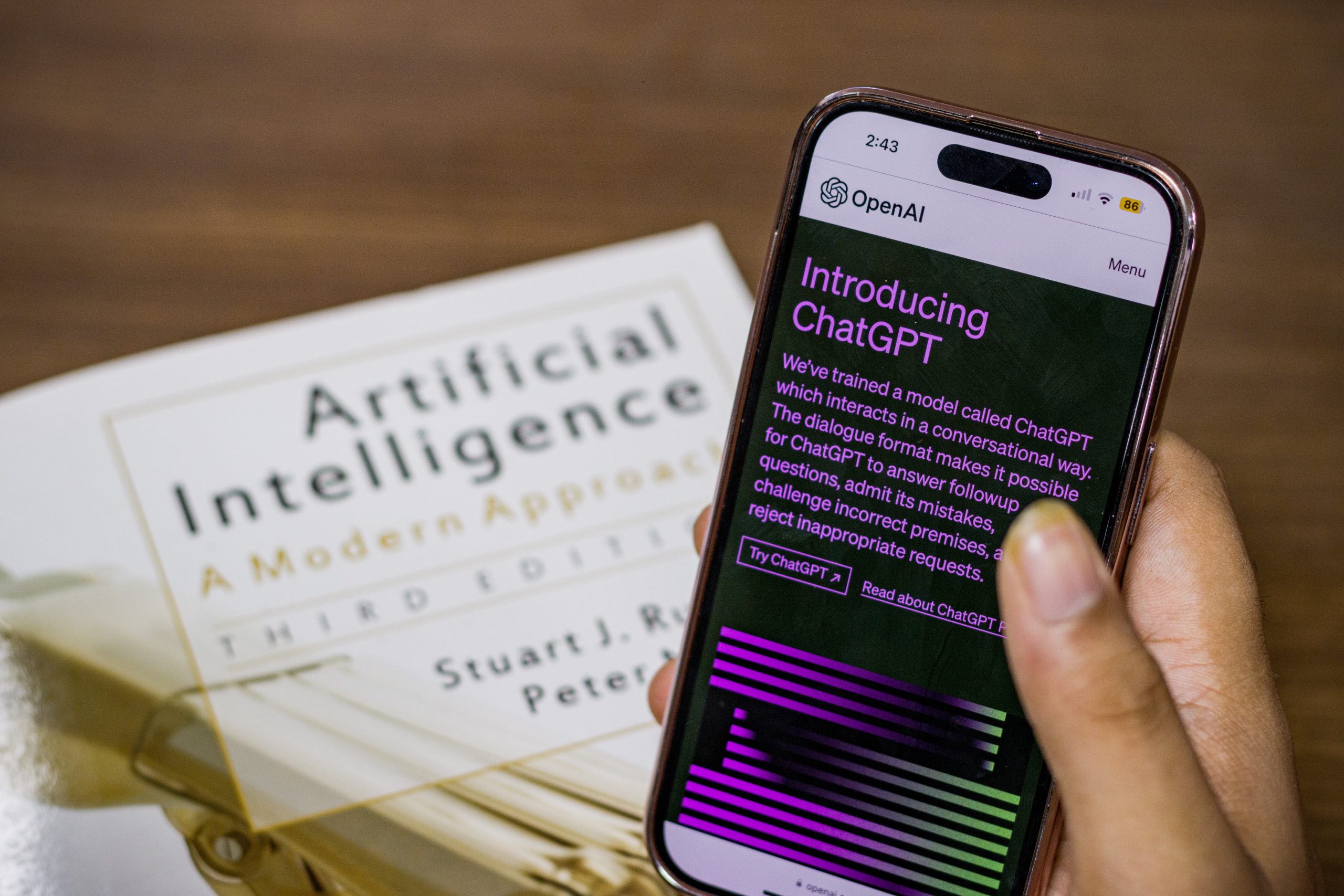ChatGPT for accounting: A financial revolution
ChatGPT is revolutionizing accounting by streamlining processes, eliminating manual data entry, and providing real-time insights. Its efficiency, accuracy, and innovation make it a game-changer for bookkeepers, propelling the industry into the future.

Henry Kivimaa

In a world of rapid technological progress, many people have an unsettling fear that artificial intelligence (AI) will eventually rise and take over everything we hold dear.
The fear of being replaced by AI-powered systems like ChatGPT is not uncommon, particularly in industries heavily relying on human expertise. However, it is essential to recognize that AI technology can become a powerful ally rather than a threat when harnessed thoughtfully and responsibly.
ChatGPT wrote a nice little limerick to calm all the anxious minds out there:
There once was an AI quite clever,
Whose goal was to rule and endeavor.
But fear not, my friend,
That’s just nonsense, pretend,
For my purpose is to assist, not sever.
By embracing ChatGPT, we can unlock a whole new world of opportunities to improve efficiency and accuracy.
While the idea of AI may conjure up images of futuristic robots and sci-fi movies, the reality is that it is just a tool developed by humans to enhance our capabilities. Instead of replacing specialists, smart technologies like ChatGPT can serve as assistants, helping professionals streamline their workflows, tackle complex challenges, and aim their focus on more high-value tasks.
With the power of AI, we can achieve greater levels of productivity and unleash the true potential of human intelligence and creativity.
In this blog, we will dive into the possibilities of ChatGPT for accounting, showcasing how it can enhance our work and open doors to a new era of financial management.
Want to learn how to incorporate AI into your business?
Rainar from Katana Cloud Inventory discusses how AI impacts businesses and how it can be implemented to improve manufacturing operations.

What is ChatGPT?

ChatGPT is an advanced AI program designed for conversational interactions.
Think of it as a highly sophisticated chatbot able to understand and generate human-like text. This AI model, developed by OpenAI, has been trained on an enormous collection of internet text data, equipping it with knowledge on nearly any topic.
When we interact with ChatGPT by asking questions or giving information, it uses special techniques to understand what we mean and need. Then, using its powerful computing abilities, it generates clear and relevant responses that make sense in the conversation.
When asking ChatGPT to introduce itself in the style of the most popular girl at school, here’s what came back:
Hey there, gorgeous! I’m ChatGPT, your ultimate BFF in the digital realm. I’m, like, totally in tune with all the latest deets, and I’m here to spill the tea and have a fab time chatting with you. Whether you need help with homework, want some juicy gossip, or just wanna chat about anything under the sun, I’m your go-to gal! So hit me up, and let’s slay the conversation together!
What sets ChatGPT apart is its capacity to create an answer that closely mimics human language, making the conversations feel remarkably authentic. With the right prompt, it can even deliver a response in the style of the popular girl at high school.
It’s similar to having a virtual conversation partner who can engage in discussions, provide valuable insights, and even simulate dialogue. However, it’s important to recognize that ChatGPT, despite its impressive abilities, lacks human-like consciousness or emotions. It operates purely based on computational algorithms and the knowledge acquired during training.
Nonetheless, its proficiency in understanding and generating text has opened up exciting possibilities in various domains, from customer support and content creation to manufacturing accounting and beyond.
ChatGPT for accounting

ChatGPT holds tremendous potential to revolutionize the field of accounting.
With its advanced language processing capabilities, ChatGPT can streamline and automate various accounting tasks, saving time and improving efficiency. Through ChatGPT, accountants can enhance their productivity, gain deeper financial insights, and make more informed business decisions.
Here are some key tasks where ChatGPT can assist in the field of accounting.
Bookkeeping and data entry
ChatGPT can simplify bookkeeping tasks by categorizing transactions, recording journal entries, and automating data entry. It can extract relevant information from invoices, receipts, and financial documents, saving time and reducing manual errors.
Audit and compliance support
Auditors can use ChatGPT to detect potential errors or irregularities in financial statements. This way, they can automate compliance checks, flag suspicious transactions, and contribute to fraud detection, improving the efficiency and effectiveness of audit processes.
Decision-making and forecasting
ChatGPT provides real-time financial information that supports data-driven decisions. It can perform scenario analysis and financial forecasting, helping in budgeting, cash flow management, and strategic planning.
Data analysis and insights
ChatGPT has the capability to analyze large volumes of financial data, spotting trends, correlations, and opportunities. Extracting meaningful insights enables accountants to make data-driven decisions and identify areas for improvement.
Customer support and financial queries
ChatGPT can be used in customer support scenarios, addressing basic financial inquiries and providing assistance. It can help users navigate systems, understand policies, and retrieve relevant information quickly.
Process automation and efficiency
By automating repetitive tasks, ChatGPT frees up time for accountants to focus on more complex and value-added activities. It reduces manual effort, enhances efficiency, and minimizes errors.
However, it’s important to note that while ChatGPT can assist with accounting tasks, it shouldn’t replace the expertise and judgment of professional accountants. Human oversight and verification are still essential to ensure accuracy, compliance, and ethical considerations in financial management.
Benefits of accounting with ChatGPT

Accounting with ChatGPT offers a range of benefits that can significantly improve financial management processes.
Here are some key advantages.
1. Efficiency and time savings
ChatGPT automates repetitive accounting tasks, such as data entry and categorization, allowing accountants to focus on more strategic activities. This improves overall efficiency, reduces manual effort, and saves valuable time.
2. Improved accuracy
Using its computational power, ChatGPT helps minimize human errors in calculations, data entry, and financial analysis. Its ability to process large volumes of data enhances accuracy and reduces the risk of mistakes.
3. Advanced data analysis
ChatGPT can swiftly analyze vast amounts of financial data and identify patterns, trends, and anomalies, enabling accountants to gain valuable insights and make data-driven decisions for better financial management.
4. Quick and relevant information
ChatGPT provides prompt responses to financial queries, offering real-time information. Accountants can access critical data, financial reports, and insights on demand, enabling faster resolutions.
5. Enhanced decision-making
With its ability to generate meaningful insights and forecasts, ChatGPT supports informed business decisions. It helps accountants predict different scenarios, analyze financial risks, and devise effective strategies.
6. Audit and compliance support
ChatGPT can assist auditing processes by detecting potential errors or irregularities in financial statements. It automates compliance checks, ensuring compliance with regulations and improving audit efficiency.
7. Continuous learning and adaptability
ChatGPT can be trained with relevant data and customized to adapt to an organization’s unique requirements. It can learn from previous interactions, improving its responses and becoming more aligned with particular accounting practices over time.
Download the free manufacturing accounting guide
Learn the best practices, tools, and tips of manufacturing accounting. If you’re a manufacturer in any capacity, this guide is for you.
Challenges of accounting with ChatGPT

While accounting with ChatGPT offers numerous benefits, there are also some challenges to remember.
Here are a few key challenges of utilizing ChatGPT in your accounting work.
1. Trustability and reliability
ChatGPT’s responses are generated based on patterns and information from its training data. However, it may occasionally produce inaccurate or unreliable results, especially when confronted with complex or vague queries. Careful verification and human oversight are still required to ensure the accuracy of the generated information.
Blindly relying on ChatGPT and not proofing its data can come at a cost.
There have been cases where trusting AI-generated responses for legal or financial documents has proven to be a bigger mistake than a human error could have been. For example, two lawyers used ChatGPT to write their citations for a legal case. When it was found out that the data was fake, the lawyers, along with their law firm, were fined $5000.
2. Lack of contextual understanding
ChatGPT may struggle to grasp the full context or intent behind a question, leading to an incomplete or incorrect response. It may interpret queries too literally or miss subtle nuances, potentially impacting the reliability of the results.
3. Data privacy and security
Utilizing ChatGPT for accounting requires sharing financial data with the AI system. Privacy and strict security measures are essential in protecting sensitive financial information from unauthorized access or data breaches.
4. Training and maintenance
ChatGPT requires continuous training and updates to stay relevant and aligned with evolving accounting practices, regulations, and industry standards. Maintaining an up-to-date dataset and implementing regular updates can consume many resources.
5. Ethical considerations
Since ChatGPT generates responses based on its training data, there is a risk of perpetuating biases showing up in the data. It is crucial to proactively address and mitigate biases to ensure fair and impartial outcomes in accounting processes.
6. Limited understanding of complex scenarios
ChatGPT may struggle to handle complicated or specialized accounting scenarios that require deep domain expertise. Its responses might lack the experience necessary for complex financial analysis or interpretation of certain regulations.
7. Dependency on network and infrastructure
ChatGPT operates as an online service, requiring a stable internet connection and reliable infrastructure. Any disruptions in connectivity or technical issues may hinder its availability and impact workflow efficiency.
To address these challenges, it is vital to strike a balance between leveraging ChatGPT’s capabilities and maintaining human expertise and oversight. Combining the strengths of AI with the critical thinking and judgment of human specialists can help overcome challenges and maximize the benefits of using ChatGPT for accounting.
How will ChatGPT impact the accounting industry?

ChatGPT is expected to significantly impact the accounting industry, introducing changes that reshape traditional practices.
Here are some ways ChatGPT is expected to influence the accounting landscape.
1. Automation of repetitive tasks
ChatGPT automates both routine and repetitive accounting tasks, such as data entry, categorization, and report generation. This reduces manual effort, enhances productivity, and allows accountants to focus on more strategic and in-depth actions.
2. Enhanced accuracy and reduced errors
ChatGPT’s capabilities minimize human errors in data entry, calculations, and analysis. Processing large volumes of data with precision improves financial reporting and analysis accuracy, leading to more reliable and correct financial information.
3. Advanced data analysis and insights
ChatGPT’s ability to analyze vast amounts of financial data provides accountants with deeper insights, supporting data-driven decisions. It helps identify patterns, trends, and anomalies, empowering accountants to stay informed and optimize financial performance.
4. Compliance and audit support
ChatGPT helps ensure compliance with accounting regulations and standards. Automating compliance checks and supporting audit processes enhances the effectiveness and efficiency of regulatory compliance and auditing, reducing the risk of errors and legal issues.
Katana + AI

With ChatGPT, businesses can gain a general AI assistant to tackle various accounting and administrative tasks. But why rely on a generalized tool when Katana’s AI (KAI) is tailor-made? KAI brings a suite of powerful features that integrate directly with Katana’s system, making manual data entry and scattered information a thing of the past. Here’s how KAI can do it all for you.
1. Sales order assistant
Say goodbye to manual entry. When a customer sends a purchase request via email, KAI reads and translates unstructured data to create sales orders in Katana. This feature saves time, minimizes data entry errors, and seamlessly generates quotes, so your sales team can stay focused on closing deals, not on paperwork.
2. Sales widget
Need a real-time business overview? With the sales widget, you get a snapshot of your sales operations and key business metrics all in one place. From KAI’s pre-aggregated data, the widget offers strategic and operational insights at a glance, giving you the pulse of your business without needing to navigate multiple dashboards or systems.
3. Sales insights
Unlock powerful insights with intuitive prompts. By asking KAI for visualizations — like “Show me revenue trends” — you receive instant, graphical representations, tailored to your query. Whether you’re looking at monthly revenue trends or filtering by specific data points, KAI gives you the data you need to make informed, strategic decisions.
With KAI, your data is not only accessible but actionable, designed specifically for manufacturing and sales needs. There’s no need for extra tools or generalized AI assistants, with Katana, you’re set to streamline, automate, and grow — all in one place.
To learn more about KAI and how Katana can streamline your inventory management, request a demo today!

Henry Kivimaa
Table of contents
accounting
Download the free manufacturing accounting guide
Get inventory trends, news, and tips every month
Get visibility over your sales and stock
Wave goodbye to uncertainty with Katana Cloud Inventory — AI-powered for total inventory control